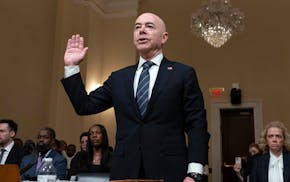Jerold L. Mullins stole meds from a hospital where he worked, went through drug treatment three times and was disciplined once after testing positive for a powerful painkiller while working as a nurse.
Yet the state board that licenses nurses in Minnesota didn't find out for 15 years.
Mullins' case is one of several high-profile incidents in recent years that have led to a proposal that would force more scrutiny of medical drug thieves. The legislation, which is scheduled for a House committee hearing Friday, would require hospitals and other health care employers to report employees to the state's professional licensing boards if they steal medication intended for patients.
"The boards need to know about these people," said Keith Berge, a member of the state Board of Medical Practice and a physician for the Mayo Clinic. "It's become more and more clear this is a hell of a patient safety issue."
Berge said thefts by medical professionals mirror the wider social epidemic of prescription drug addiction. He served on a special state task force created in 2011 that found that the number of drug thefts by Minnesota health care workers increased 325 percent from 2006 to 2010.
Just Wednesday, a former nurse at St. Cloud Hospital was sentenced to two years in federal prison after stealing intravenous drugs from 25 patients and replacing them with saltwater in their IV bags. Six patients were infected with a rare bacteria and one died, although the hospital has disputed the case's link to the death. In 2011, a former nurse at Abbott Northwestern Hospital was charged with stealing painkillers intended for a surgery patient and then telling him to "man up" during a painful kidney stone removal.
The Minnesota Hospital Association has recognized the problem and now recommends theft-prevention measures such as surveillance cameras, locked drug cabinets and bar code tracking of medications.
Still, some groups fear that the proposal could undermine Minnesota's two-decade-old program for helping medical professionals who have addiction or mental health problems. The Health Professionals Services Program (HPSP), which monitors professionals as they go through treatment, hinges on confidentiality and touts itself to doctors, nurses and others as a nondisciplinary alternative to board discipline.
Current law allows employees and institutions to meet state reporting requirements if those suffering from addiction report to the program and undergo a monitored treatment regimen. Proponents say confidentiality and the emphasis on treating addiction as a disease encourages medical professionals to seek help before their addictions harm others.
Last year, 489 health professionals were referred to the program for addiction and mental health problems and 455 were discharged.
The Minnesota Nurses Association, which sits on an HPSP advisory panel, on Wednesday voted to oppose any changes to the system. The vote echoed one last year by the full HPSP advisory panel, which said the program should continue in its current form with confidential monitoring.
The nurses association believes the current system does protect patient safety, said Bernadine Engeldorf, first vice president with the association. "I think there's a potential of driving individuals underground and maybe not seeking monitoring," Engeldorf said.
HPSP itself, which is overseen by a committee of health professional boards, has not taken an official position on the new reporting proposal — in part because the professional licensing groups do not all agree. The state medical board, which licenses doctors, along with the pharmacy board and the nursing board support the change.
"The issue is the board's role of protecting the public," said Shirley Brekken, executive director of the nursing board. "The board relies on adequate information to make decisions about any kind of action that might need to be taken against a licensee."
The Board of Dentistry has expressed concerns that the proposal could have a chilling effect on disclosure by professionals, but is not formally opposing it. "It is not real fond of the direction it's going … of criminalizing illness rather than trying to deal with it in a confidential way," said Marshall Shragg, executive director.
Berge, who oversees Mayo's drug diversion prevention effort, said nothing in the bill will affect the HPSP because it does not change the program's reporting requirements.
"People diverting drugs are not self-reporting," he said.
Sen. Carla Nelson, R-Rochester, said cases like Mullins' are an example of the system not working. Her bill, she said, tries to balance the competing concerns, while offering additional checks on the system.
"The idea is to protect the patient," she said. "That's number one and that's the job of the licensing boards."
Brad Schrade • 612-673-4777
New Black congressional district in Louisiana bows to politics, not race, backers say
Trump trial jury selection process follows a familiar pattern with an unpredictable outcome
Climate change concerns grow, but few think Biden's climate law will help, AP-NORC poll finds
